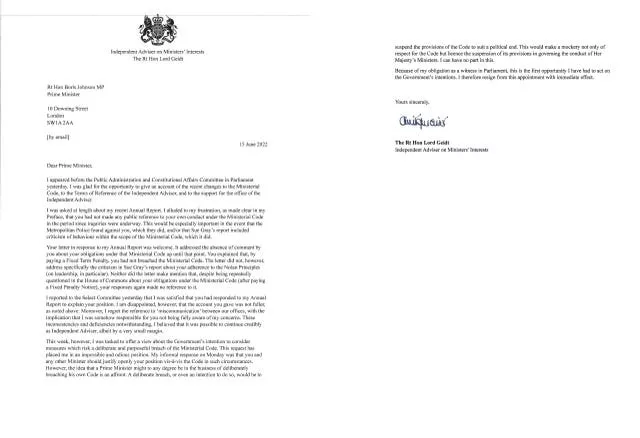Boris Johnson considered action risking a deliberate breach of his own ministerial code, Lord Geidt said as he quit as ethics adviser over the “impossible and odious” position.
The ministerial interests adviser said in his resignation letter to the British prime minister that he had been only credibly clinging onto the role “by a very small margin” over partygate.
But Lord Geidt said he was forced to quit when he was tasked with offering a view on the UK government’s “intention to consider measures which risk a deliberate and purposeful breach of the ministerial code”.
The prime minister’s response to the shock resignation after a year of dealing with multiple potential breaches of the code indicated that it was relating to advice on the Trade Remedies Authority (TRA).
In the letter published on Thursday, Lord Geidt wrote: “This request has placed me in an impossible and odious position.”

He said the idea that the prime minister “might to any degree be in the business of deliberately breaching his own code is an affront”.
“A deliberate breach, or even an intention to do so, would be to suspend the provisions of the code to suit a political end. This would make a mockery not only of respect for the code but licence the suspension of its provisions in governing the conduct of Her Majesty’s ministers.
“I can have no part in this.”
In his response, Mr Johnson said his intention was to seek Lord Geidt’s “advice on the national interest in protecting a crucial industry”.
He said the unspecified industry “is protected in other European countries and would suffer material harm if we do not continue to apply such tariffs”.

Mr Johnson insisted the matter has previously had cross-party support and that the request would be in line with domestic law “but might be seen to conflict” with the UK’s obligations under the World Trade Organisation.
“In seeking your advice before any decision was taken, I was looking to ensure that we acted properly with due regard to the ministerial code,” Mr Johnson insisted.
Lord Geidt’s resignation on Wednesday came after he told MPs it was “reasonable” to suggest Mr Johnson broke the code by being fined by police for breaching Covid laws.
In his letter, he said he was “disappointed” that the prime minister did not give a fuller account over how paying the fixed penalty notice did not breach the code.
Lord Geidt expressed “regret” that the reference to “miscommunication” between their offices implied he “was somehow responsible for you not being fully aware of my concerns”.
“These inconsistencies and deficiencies notwithstanding, I believed that it was possible to continue credibly as independent adviser, albeit by a very small margin,” he wrote.
But he said his resignation was forced over the request relating to the TRA, the body set up to protect UK industries from unfair practices or unexpected surges in imports.
“Because of my obligation as a witness in Parliament, this is the first opportunity I have had to act on the Government’s intentions. I therefore resign from this appointment with immediate effect,” the crossbench peer wrote.
Lord Geidt became the second ministerial interests adviser to resign during Mr Johnson’s three years in office when a brief statement was published on Wednesday evening.
But the 21-word statement left the reason for his departure a mystery until the exchange of letters was published as the UK government came under pressure to provide clarity.
Deputy prime minister Dominic Raab, who is also the justice secretary, suggested a “pretty rough” appearance before the Commons Public Administration and Constitutional Affairs Committee on Tuesday could have contributed to the departure.
He said Lord Geidt had been in talks with Mr Johnson this week about staying on in the role for six months and appeared “committed” to the job.
But Mr Raab told Sky News: “I think he had a pretty rough grilling by MPs this week. I think sometimes we in the media and as politicians maybe underestimate how civil servants feel with that kind of scrutiny.”







